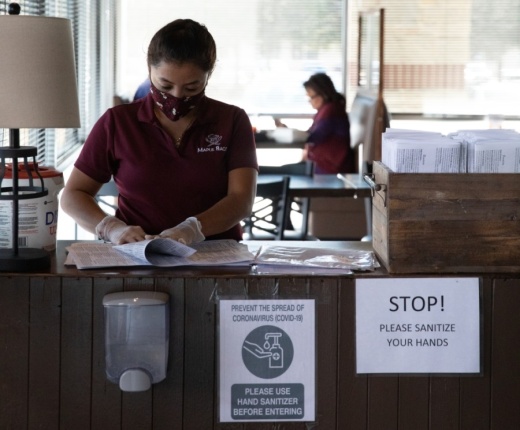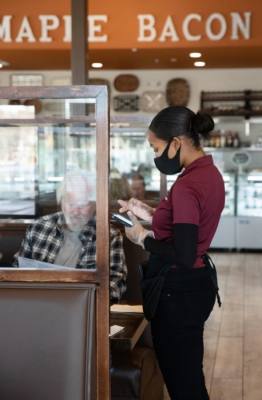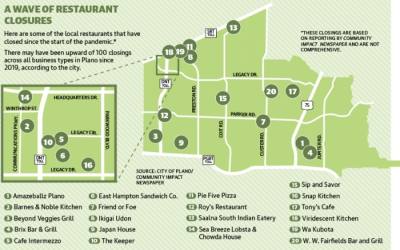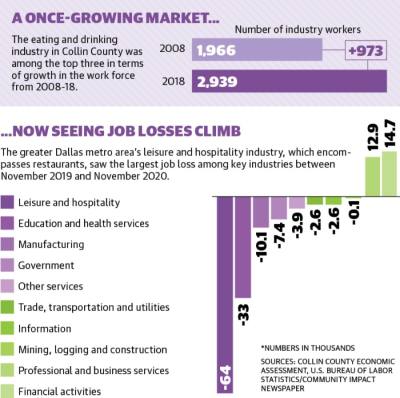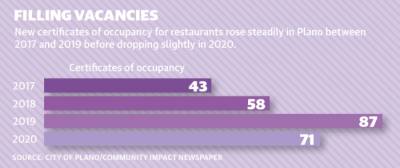Since opening in December 2019, Maple Bacon saw an estimated loss of $100,000 in its first year of business, Delaurier said.
According to the Texas Restaurant Association, the industry has been “decimated by the COVID-19 pandemic,” with more than 10,000 closures statewide as of December.
Restaurants that survived the crisis have made many adjustments along the way. Some have been temporary, while other changes have been made for the long haul.
And while the future of the industry remains uncertain, restaurant owners have said they hope dispersal of vaccines will help alleviate capacity restrictions and restore confidence in diners who have for months opted to stay home.
“We pray for those vaccinations,” Delaurier said. “That’s the only thing that’s going to get us back to normal.”
Franchised and chain restaurants, especially those already equipped with delivery and takeout services, have had an easier time shouldering the financial burden brought on by the pandemic, according to Bob Young, executive managing director at Weitzman, a Dallas-based retail real estate firm that studies trends in North Texas.
Smaller, locally run restaurants have also shown a greater ability to pivot and adapt to a new set of customer needs, Young said.
“[Major chains] sometimes don’t have the ability to make those changes,” he said. “They may not be quite as fast-moving.”
In downtown Plano, ZaLat Pizza quickly transitioned the bulk of its operations to delivery-only. The location has set a record number of sales in 2020, front-of-house and bar manager C.J. Garrett said. This is partially due to the fact that pizzerias have a well-established to-go and delivery model but also because of the growth in apartments downtown, he said.
Chinese restaurant Yao Fuzi Cuisine in Preston Towne Crossing shopping center made a similar change, moving much of staff from waiting tables to taking to-go orders over the phone and driving deliveries, owner Chris Yao said. The restaurant does not have any immediate plans to switch those staff back, he said.
The Latin Pig, a Cuban food restaurant at the Custer Park Shopping Center, changed its full-service dining room into a counter-service restaurant, where orders are placed at the register and food is brought to the table. This helps limit contact, owners Ana and John Castillo said. Contactless pay, a trimmed-down menu, and the creation of a delivery service are among changes they have made.
Others, like Maple Bacon, have had a harder time transitioning to takeout. Popular dishes, such as waffles, become soggy in transport, Delaurier said, so the restaurant continues to rely heavily on in-person dining.
Plano staple Front Burner Dining, meanwhile, used the pandemic to refocus on its core brands. Now called FB Society, the company let go of some partially owned brands and plans to expand its core restaurants, such as Whiskey Cake and Sixty Vines, and create new culinary concepts, CEO Jack Gibbons said.
“We’re trying to use 2020 as a year that we learn things, we become more efficient, [and] we become a stronger organization. So that moving forward after the pandemic, we’re in a great position,” Gibbons said.
In December, after COVID-19 hospitalizations surpassed a 15% threshold in North Texas, capacity was once again rolled back. Sales have been directly linked to case numbers, Ana Castillo said. The higher case counts get, the lower sales fall, she said.
Outside assistance
City staff has stepped up to help local restaurants through two Visit Plano programs. The city-funded department is normally focused on attracting business for Plano hotels; however, it chose to refocus its efforts on restaurants as travel slowed in recent months, marketing manager Millerann Moya said.
A six-week foodie check-in challenge called “Taste of Plano” is expected to begin in February.
Restaurants can sign up to participate in the challenge and will have the option to add coupons and deals. Diners can then check in at participating restaurants and receive a prize for visiting up to 25 local spots.
Another way Visit Plano is increasing restaurant visibility is through the continuation of “That’s Tempting,” an online video project that highlights offerings at local restaurants.
The city of Plano also awarded $92,000 in small business grants to six restaurants with 15 or fewer employees. A larger number of Plano restaurants were served by the Collin County CARES program, which awarded $17.6 million in grants to restaurants and other small businesses in the county.
Added relief may also be in store for local restaurants through a second wave of the Paycheck Protection Program funds approved by the federal government in late December. Applications for the program opened Jan. 11.
Grappling with less business and additional expenses at Maple Bacon was made easier through the help of the first round of the federal Paycheck Protection Program, Delaurier said.
“That probably saved us,” she said.
The Latin Pig used the federal funds to keep its Plano and The Colony locations open for the first eight months of the pandemic. But in October owners closed The Colony location when federal funds dwindled and the burden of operational expenses became too much to bear, the Castillos said.
“We are all trying to survive, and the money that we’re getting from the government, hopefully ... will help us just coast through the next couple of months,” Ana Castillo said.
Future growth
Plans for mixed-use developments in Plano continue to include restaurants, Planning Director Christina Day said. This is reflected in approved redevelopment plans for both the Collin Creek Mall and Plano Market Square Mall, she said. Additionally, there were just over 70 certificates of occupancy filed for restaurants in 2020—a slight drop from the year before, but higher than in 2017 and 2018, city data shows.
“If anything, I believe the confidence in restaurants continues to be high,” Day said.
Most recently, the Collin Creek Mall property received approval by council for a design that replaces an originally planned hotel location with a deck that includes dining. Restaurants, as well as retail and residential spaces, will also be a dominant feature of the property when its first phase opens in 2022, said Sean Terry, COO of Centurion American Development Group, who spoke of their development at a recent Plano Chamber of Commerce panel.
Location is a big factor for restaurant survival, Young said. The best spots have good density and co-tenancy, like the future developments and shopping centers sprinkled throughout Plano, such as Windhaven Plaza, where Maple Bacon sits, he said.
“I am very grateful for the spot I am in,” Delaurier said. “As a brand-new restaurant that just opened, I do think it’s one of the reasons that I did survive.”
Olivia Lueckemeyer contributed to this report.




